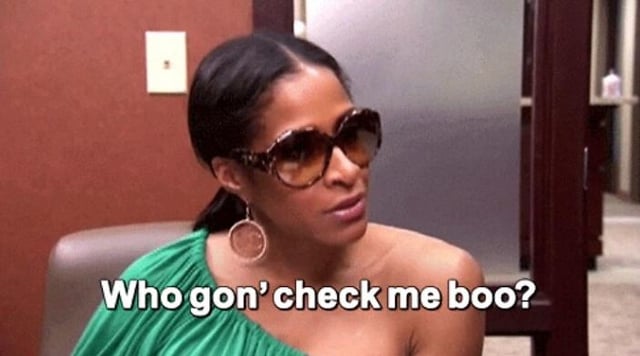
Who Gon Check Me Boo – Still the Ultimate Power Move
In the ephemeral echo chamber of internet culture, where memes rise and fall like fleeting empires, a phrase born from a seemingly petty squabble on reality television has not only endured but calcified into an unassailable declaration. “Who gon check me, boo?” uttered by Sheree Whitfield to a recalcitrant party planner on The Real Housewives of Atlanta over a decade ago, was more than just a sassy clapback. It was, and remains, the ultimate power move, a distillation of audacious self-possession that disarms, defines, and delivers an undeniable statement of autonomy.
At its core, the phrase is a rhetorical question that answers itself with thunderous silence. It’s an audacious demand for an accounting of authority that no one possesses. The "who" implies a search for a legitimate challenger, a valid arbiter, and the subtext is clear: there isn't one. The "gon check me" isn't a plea for correction but a dismissal of the very notion that one requires or is subject to external scrutiny or validation. And the final, dismissive "boo" adds a layer of casual disdain, transforming a potential confrontation into a unilateral declaration of war's end, on one's own terms. It’s a psychological mic drop, leaving the recipient grasping for air, their intended criticism rendered moot by a supreme act of unbothered self-affirmation.
The power of "Who gon check me, boo?" lies in its versatility and its psychological warfare. Consider its application in various illustrative scenarios:
In Personal Boundaries: Imagine the exhausted professional, perpetually overloaded with tasks that aren't theirs, finally reaching their breaking point. When a colleague attempts to offload yet another project, the internal, unspoken retort isn't "I can't" or "that's not my job," but a defiant, "Who gon check me, boo?" as they politely but firmly decline. It's the silent assertion of one's limits, the refusal to be dictated by others' expectations or demands. It’s the reclamation of personal bandwidth, the ultimate veto against encroachment on one's time, energy, or peace. The power comes from not needing to justify the refusal, but simply asserting the right to make it.
In Creative Expression: Think of the artist, the writer, the musician who pours their soul into a piece, only to be met with conventional wisdom or market-driven suggestions to conform, to dilute, to appeal to a wider audience. The temptation to compromise is immense. But the artist who truly embraces their vision, who creates from an unshakeable inner wellspring, might mentally or even verbally echo, "Who gon check me, boo?" to the critics and the gatekeepers. It’s the declaration of artistic integrity, the refusal to allow external opinions to warp an authentic expression. It’s the brave act of forging one’s own path, unafraid of judgment, because the only validator is the creator themselves. Their work stands on its own, beyond the reach of external "checkers."
In Social and Political Discourse: While typically used in a personal context, the spirit of the phrase resonates in larger arenas. Consider the whistleblower, the activist, the lone voice speaking truth to power against a tide of established norms or corporate interests. They are often told they are wrong, misguided, or even dangerous. Yet, their commitment to their truth often stems from an intrinsic sense of rightness, an internal compass that says, "I know what I’m doing, and I’m going to do it, because who really has the authority to tell me otherwise, when the stakes are this high and the truth is this clear?" It's a defiant stand against the status quo, an assertion that moral authority often trumps institutional power.
What makes "Who gon check me, boo?" the ultimate power move is its inherent accessibility and its inversion of traditional power dynamics. Unlike other power moves that rely on wealth, status, brute force, or complex strategy, this phrase requires nothing but unshakeable self-belief. It democratizes dominance. It shifts the burden of proof from the person being "checked" to the one attempting to do the checking, forcing them to justify their intervention. When no justification exists, or when the "checker" realizes their authority is arbitrary or imagined, the power dynamic instantly flips.
In an age of constant external validation, where social media metrics and public opinion often dictate self-worth, the unbothered authenticity of "Who gon check me, boo?" serves as a powerful antidote. It’s a return to the self, a defiant embrace of one's own narrative, one's own boundaries, and one's own truth. It's not about being aggressive or confrontational for its own sake, but about the quiet, radical strength of self-possession. It's the ultimate declaration of "I am," uttered with such conviction that any attempt to question it simply dissolves. And that, truly, is a power that transcends petty squabbles, making "Who gon check me, boo?" an enduring anthem for anyone asserting their sovereign self in a world eager to scrutinize.